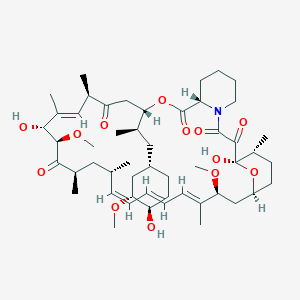Ferroptosis-centered Drug Response Information
General Information of the Drug (ID: ferrodrug0073)
| Name |
Rapamycin
|
||||
|---|---|---|---|---|---|
| Synonyms |
(-)-Rapamycin; 53123-88-9; AY 22989; AY-22989; I 2190A; I-2190A; I2190A; NSC 226080; RAPA; Rapammune; Rapamune; Rapamycin; SIIA 9268A; Sirolimus; Wy 090217; rapalimus; Supralimus; WY-090217; Rapamycin (Sirolimus); HYFTOR; sirolimusum; Cypher; Antibiotic AY 22989; Rapamycin (GMP); FYARRO; CCRIS 9024; CHEBI:9168; SILA 9268A; W36ZG6FT64; HSDB 7284; L04AA10; Npc-12g; SM-88 COMPONENT SIROLIMUS; DE-109; NSC-226080; UNII-W36ZG6FT64; DTXSID5023582; NAB-RAPAMYCIN COMPONENT RAPAMYCIN; SIROLIMUS (MART.); SIROLIMUS [MART.]; EC 610-965-5; SIROLIMUS (USP-RS); SIROLIMUS [USP-RS]; C51H79NO13; NSC226080; (1R,9S,12S,15R,16E,18R,19R,21R,23S,24E,26E,28E,30S,32S,35R)-1,18-dihydroxy-12-{(2S)-1-[(1S,3R,4R)-4-hydroxy-3-methoxycyclohexyl]propan-2-yl}-19,30-dimethoxy-15,17,21,23,29,35-hexamethyl-11,36-dioxa-4-azatricyclo[30.3.1.0(4,9)]hexatriaconta-16,24,26,28-tetraene-2,3,10,14,20-pentone; (3S,6R,7E,9R,10R,12R,14S,15E,17E,19E,21S,23S,26R,27R,34aS)-9,27-dihydroxy-3-{(2R)-1-[(1S,3R,4R)-4-hydroxy-3-methoxycyclohexyl]propan-2-yl}-10,21-dimethoxy-6,8,12,14,20,26-hexamethyl-9,10,12,13,14,21,22,23,24,25,26,27,32,33,34,34a-hexadecahydro-3H-23,27-epoxypyrido[2,1-c][1,4]oxazacyclohentriacontine-1,5,11,28,29(4H,6H,31H)-pentone; RAP; EVEROLIMUS IMPURITY A (EP IMPURITY); EVEROLIMUS IMPURITY A [EP IMPURITY]; (3S,6R,7E,9R,10R,12R,14S,15E,17E,19E,21S,23S,26R,27R,34aS)-9,10,12,13,14,21,22,23,24,25,26,27,32,33,34,34a-Hexadecahydro-9,27-dihydroxy-3-((1R)-2-((1S,3R,4R)-4-hydroxy-3-methoxycyclohexyl)-1-methylethyl)-10,21-dimethoxy-6,8,12,14,20,26-hexamethyl-23,27-epoxy-3H-pyrido(2,1-c)(1,4)oxaazacyclohentriacontine-1,5,11,28,29(4H,6H,31H)-pentone; DTXCID503582; Perceiva; 1fkb; 1pbk; NCGC00021305-05; Rapamycin from Streptomyces hygroscopicus; Rapamycin/Sirolimus; LCP-Siro; (1R,9S,12S,15R,16E,18R,19R,21R,23S,24E,26E,28E,30S,32S,35R)-1,18-dihydroxy-12-((2S)-1-((1S,3R,4R)-4-hydroxy-3-methoxycyclohexyl)propan-2-yl)-19,30-dimethoxy-15,17,21,23,29,35-hexamethyl-11,36-dioxa-4-azatricyclo(30.3.1.0(4,9))hexatriaconta-16,24,26,28-tetraene-2,3,10,14,20-pentone; (3S,6R,7E,9R,10R,12R,14S,15E,17E,19E,21S,23S,26R,27R,34aS)-9,10,12,13,14,21,22,23,24,25,26,27,32,33,34,34a-Hexadecahydro-9,27-dihydroxy-3-[(1R)-2-[(1S,3R,4R)-4-hydroxy-3-methoxycyclohexyl]-1-methylethyl]-10,21-dimethoxy-6,8,12,14,20,26-hexamethyl-23,27-epoxy-3H-pyrido[2,1-c][1,4]oxaazacyclohentriacontine-1,5,11,28,29(4H,6H,31H)-pentone; (3S,6R,7E,9R,10R,12R,14S,15E,17E,19E,21S,23S,26R,27R,34aS)-9,27-dihydroxy-3-((2R)-1-((1S,3R,4R)-4-hydroxy-3-methoxycyclohexyl)propan-2-yl)-10,21-dimethoxy-6,8,12,14,20,26-hexamethyl-9,10,12,13,14,21,22,23,24,25,26,27,32,33,34,34a-hexadecahydro-3H-23,27-epoxypyrido(2,1-c)(1,4)oxazacyclohentriacontine-1,5,11,28,29(4H,6H,31H)-pentone; (3S,6R,7E,9R,10R,12R,14S,15E,17E,19E,21S,23S,26R,27R,34aS)-9,27-dihydroxy-3-{(1R)-2-[(1S,3R,4R)-4-hydroxy-3-(methyloxy)cyclohexyl]-1-methylethyl}-6,8,12,14,20,26-hexamethyl-10,21-bis(methyloxy)-9,10,12,13,14,21,22,23,24,25,26,27,32,33,34,34a-hexadecahydro-3H-23,27-epoxypyrido[2,1-c][1,4]oxazacyclohentriacontine-1,5,11,28,29(6H,31H)-pentone; RPM; MFCD00867594; S1039; SIROLIMUS [INN]; SIROLIMUS [JAN]; RAPAMYCIN [MI]; Human Blood - Sirolimus; SIROLIMUS [HSDB]; SIROLIMUS [USAN]; SIROLIMUS [VANDF]; BiomolKI2_000084; SCHEMBL3463; SIROLIMUS [WHO-DD]; Rapamycin,Sirolimus,Rapamune; BIDD:PXR0165; SIROLIMUS [EMA EPAR]; 23,27-Epoxy-3H-pyrido[2,1-c][1,4]oxaazacyclohentriacontine; MLS006010168; Sirolimus [USAN:INN:BAN]; GTPL6031; SIROLIMUS [ORANGE BOOK]; BDBM36609; MS-R001; S01XA23; QFJCIRLUMZQUOT-HPLJOQBZSA-N; HMS2089A21; HMS3403F11; HMS3884C03; EX-A1044; AC-722; BDBM50064359; HY-10219G; STL570275; AKOS015850976; AKOS015961618; CCG-100684; CS-0063; DB00877; NSC-2260804; NCGC00021305-06; NCGC00021305-07; AS-11687; HY-10219; SMR004701276; Fyarro (sirolimus albumin-bound particles); UNM-0000358684; A-275; CS-0626126; R0097; Rapamycin, VETRANAL(TM), analytical standard; M02444; Q32089; Q-201659; BRD-K84937637-001-04-0; BRD-K84937637-001-06-5; BRD-K89626439-001-01-0; Z2568665260; 24,25,26,27,32,33,34,34a-hexadecahydro-3H-23,27-epoxypy; Rapamycin from Streptomyces hygroscopicus, >=95% (HPLC), powder; Rapamycin from Streptomyces hygroscopicus, Vetec(TM) reagent grade, >=95%; (1R,9S,12S,15R,16E,18R,19R,21R,23S,24E,26E,28E,30S,32S,35R)-1,18-Dihydroxy-12-((1R)-2-((1S,3R,4R)-4-hydroxy-3-methoxycyclohexyl)-1-methylethyl)-19,30-dimethoxy-15,17,21,23,29,35-hexamethyl-11,36-dioxa-4-azatricyclo(30.3.1.04,9)hexatriaconta-16,24,26,28-tetraene-2,3,10,14,20-pentaone; (1R,9S,12S,15R,16E,18R,19R,21R,23S,24E,26E,28E,30S,32S,35R)-1,18-Dihydroxy-12-{(2S)-1-[(1S,3R,4R)-4-hydroxy-3-methoxycyclohexyl]propan-2-yl}-19,30-dimethoxy-15,17,21,23,29,35-hexamethyl-11,36-dioxa-4-azatricyclo[30.3.1.04,9]hexatriaconta-16,24,26,28-tetraene-2,3,10,14,20-pentone; (3 S,6 R,7 E,9 R,10 R,12 R,14 S,15 E,17 E, 19 E,21 S,23 S,26 R,27 R,34a S)-9,10,12,13,14,21,22,23,24,25,26,27,32,33,34, 34a-hexadecahydro-9,27-dihydroxy-3-; (3S,6R,7E,9R,10R,12R,14S,15E,17E,19E,21S,23S,26R,27R,34 aS)-9,10,12,13,14,21,22,23,24,25,26,27,32,33,34,34a-Hex adecahydro-9,27-dihydroxy-3-[(1R)-2-[(1S,3R,4R)-4-hydro xy-3-methoxycyclohexyl]-1-methylethyl]-10,21-dimethoxy- 6,8,12,14,20,26-hexamethyl-23,27-ep; (3S,6R,7E,9R,10R,12R,14S,15E,17E,19E,21S,23S,26R,27R,34aS)-4,9,10,12,13,14,21,22,23,24,25,26,27,32,33,34,34a-heptadecahydro-9,27-dihydroxy-3-[(1R)-2-[(1S,3,4R)-4-hydroxy-3-methoxycyclohexyl]-1-methylethyl]-10,21-dimethoxy-6,8,12,14,20,26-hexamethyl-223,27-Epoxy-3H-pyrido[2,1-c][1,4]oxaazacyclohentriacontine-1,5,11,28,29(6H,31H)-pentone; (3S,6R,7E,9R,10R,12R,14S,15E,17E,19E,21S,23S,26R,27R,34aS)-9,27-dihydroxy-3-{(1R)-2-[(1S,3R,4R)-4-hydroxy-3-(methyloxy)cyclohexyl]-1-methylethyl}-6,8,12,14,20,26-hexamethyl-10,21-bis(methyloxy)-9,10,12,13,14,21,22,23,24,25,26,27,32,33,34,34a-hexadecahydro; (3S,6R,7E,9R,10R,12R,14S,15E,17E,19E,21S,23S,26R,27R,34aS)-9,27-dihydroxy-3-{(1R)-2-[(1S,3R,4R)-4-hydroxy-3-methoxycyclohexyl]-1-methylethyl}-10,21-dimethoxy-6,8,12,14,20,26-hexamethyl-9,10,12,13,14,21,22,23,24,25,26,27,32,33,34,34a-hexadecahydro-3H-23,27-epoxypyrido[2,1-c][1,4]oxazacyclohentriacontine-1,5,11,28,29(4H,6H,31H)-pentone; (3S,6R,7E,9R,10R,12R,14S,15E,17E,19E,21S,23S,26R,27R,34aS)-9,27-dihydroxy-3-{1-[(1S,3R,4R)-4-hydroxy-3-methoxycyclohexyl]propan-2-yl}-10,21-dimethoxy-6,8,12,14,20,26-hexamethyl-9,10,12,13,14,21,22,23,; 1,18-Dihydroxy-12-[2-(4-hydroxy-3-methoxy-cyclohexyl)-1-methyl-ethyl]-19,30-dimethoxy-15,17,21,23,29,35-hexamethyl-11,36-dioxa-4-aza-tricyclo[30.3.1.0*4,9*]hexatriaconta-16,24,26,28-tetraene-2,3,10,14,20-pentaone (Rapamycin); 9,10,12,13,14,21,22,23,24,25,26,27,32,33,34,34a-Hexadecahydro-9,27-dihydroxy-3-((1R)-2-((1S,3R,4R)-4-hydroxy-3-methoxycyclohexyl)-1-methylethyl)-10,21-dimethoxy-6,8,12,14,20,26-hexamethyl-23,27-epoxy-3H-pyrido(2,1-c)(1,4)oxaazacyclohentriacontine-1,5,11,2
Click to Show/Hide
|
||||
| Structure |
 |
||||
|
3D MOL
|
|||||
| Formula |
C51H79NO13
|
||||
| IUPAC Name |
(1R,9S,12S,15R,16E,18R,19R,21R,23S,24E,26E,28E,30S,32S,35R)-1,18-dihydroxy-12-[(2R)-1-[(1S,3R,4R)-4-hydroxy-3-methoxycyclohexyl]propan-2-yl]-19,30-dimethoxy-15,17,21,23,29,35-hexamethyl-11,36-dioxa-4-azatricyclo[30.3.1.04,9]hexatriaconta-16,24,26,28-tetraene-2,3,10,14,20-pentone
|
||||
| Canonical SMILES |
CC1CCC2CC(C(=CC=CC=CC(CC(C(=O)C(C(C(=CC(C(=O)CC(OC(=O)C3CCCCN3C(=O)C(=O)C1(O2)O)C(C)CC4CCC(C(C4)OC)O)C)C)O)OC)C)C)C)OC
|
||||
| InChI |
InChI=1S/C51H79NO13/c1-30-16-12-11-13-17-31(2)42(61-8)28-38-21-19-36(7)51(60,65-38)48(57)49(58)52-23-15-14-18-39(52)50(59)64-43(33(4)26-37-20-22-40(53)44(27-37)62-9)29-41(54)32(3)25-35(6)46(56)47(63-10)45(55)34(5)24-30/h11-13,16-17,25,30,32-34,36-40,42-44,46-47,53,56,60H,14-15,18-24,26-29H2,1-10H3/b13-11+,16-12+,31-17+,35-25+/t30-,32-,33-,34-,36-,37+,38+,39+,40-,42+,43+,44-,46-,47+,51-/m1/s1
|
||||
| InChIKey |
QFJCIRLUMZQUOT-HPLJOQBZSA-N
|
||||
| PubChem CID | |||||
Full List of Ferroptosis Target Related to This Drug
Unspecific Target
| In total 1 item(s) under this Target | |||||
| Experiment 1 Reporting the Ferroptosis-centered Drug Act on This Target | [1] | ||||
| Responsed Disease | Hereditary Leiomyomatosis | ICD-11: 2C90 | |||
| Responsed Regulator | Serine/threonine-protein kinase mTOR (MTOR) | Suppressor | |||
| Pathway Response | Fatty acid metabolism | hsa01212 | |||
| Ferroptosis | hsa04216 | ||||
| Cell Process | Cell ferroptosis | ||||
| In Vitro Model | UOK262 cells | Hereditary leiomyomatosis | Homo sapiens | CVCL_1D72 | |
| NCCFH1 (Human hereditary leiomyomatosis and renal cell cancer cells) | |||||
| In Vivo Model |
Ten million NCCFH1 cells suspended in a 1:1 ratio of PBS:Matrigel were injected into the right flank of each animal. Tumors were measured twice a week using a digital caliper, and tumor volumes were calculated according to the volume of an ellipsoid. When mean tumor volumes reached 100 mm3, an equal number of male and female mice were randomly assigned into four different groups. Thirty three of the 40 mice used in the experiment developed tumors. Thus, the final group assignment was as follow: vehicle (control group, n = 6, 3 female & 3 male), rapamycin (rapamycin only group, n = 7, 4 female & 3 male), Cyst(e)inase (Cyst(e)inase only group, n = 10, 5 female & 5 male), rapamycin+Cyst(e)inase (combination group, n = 10, 5 female & 5 male). Treatments were administered once every three days via intraperitoneal injection of either vehicle (Phosphate buffered saline containing 30% PEG300), rapamycin (0.6 mg/ml suspended in vehicle, injection dose = 0.6 mg per mouse), Cyst(e)inase (7.1 mg/ml suspended in vehicle, injection dose = 7.1 mg per mouse), and rapamycin+Cyst(e)inase combination (0.6 mg/ml rapamycin, 7.1 mg/ml Cyst(e)inase suspended in vehicle.
Click to Show/Hide
|
||||
| Response regulation | Rapamycin treatment inhibited MTOR signaling. And it is possible to induce ferroptosis in an hereditary leiomyomatosis and renal cell cancer (HLRCC) tumor model in vivo using a combination of rapamycin and Cyst(e)inase. | ||||
